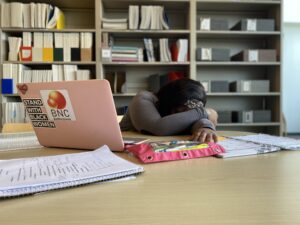
During midterms many students didn’t get enough Zs. As students prepare to take exams, getting enough sleep may not be at the top of their to-do list. But according to the American Academy of Sleep Medicine (AASM), getting enough rest is vital to success.
“I’m always tired at school and work and it negatively impacts my mood. I end up going to work grumpy and I don’t feel like my happy, energized self. I tend to zone out in class. Or sometimes I’ll just keep watching the clock because when I get out I can finally go to sleep,” said Alysia Franklin a junior business student at FAMU.
This is National Sleep Awareness Week. This week falls on the same week that many students at Florida A&M University will be taking midterm exams. It serves as a reminder of how important getting proper rest is.
Getting rid of things that can disrupt your sleep, according to the National Sleep Foundation, is a step in the right direction. “This includes stimulants like coffee and energy drinks, alarm clocks, and external lights (including those from electronic devices). These items can interfere with our “circadian rhythm” or natural sleep/wake cycle.
FAMU has a large population of students who work and are enrolled full-time. Creating a school and work life balance can be challenging for some. This is necessary to ensure success in both areas.
A study conducted by the Journal of the National Sleep Foundation studied more than 2,000 college students to see if there was a link to “ethnoracial sleep disparities among college students living in dormitories in the U.S.” The study found that black college students reported shorter sleeping times than white college students.
The amount of sleep that young adults (ages18 to 25) should get ranges from 7-9 hours, according to the NSF. Not getting enough sleep at night can negatively impact a student’s grades.
“During finals my sleep is usually little to none unless they spread my finals out on different days. It’s sometimes difficult to balance school and work and finding times to study. With all that going on I maybe get 2-3 hours of sleep during the week of finals,” Franklinsaid.
According to the AASM, the best way to maximize performance on final exams is to both study and get a good night of sleep. And sleep deprivation and poor sleep quality are common among college students.
Which in turn affects their academic performance and daytime functioning.
“I find it hard to perform at 100 percent when I am sleep deprived. School work slacks, real work slacks,” said Ciara Holloman, a FAMU graduate.
To ensure that students are able to perform properly, as well as execute tasks to the best of their abilities, learning how to get proper rest is imperative.
The AASM mentioned several tips on how to get proper rest as a student. “Students should go to bed early enough to have the opportunity for a full night of sleep. If you have trouble falling asleep, get out of bed and do something relaxing until you feel sleepy. Don’t study, read, watch TV or talk on the phone in bed. Only use your bed for sleep. Take some time to wind down before going to bed. Get away from the computer, turn off the TV and the cell phone, and relax quietly for 15 to 30 minutes.”